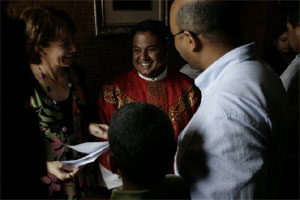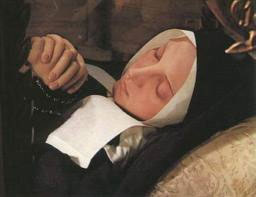Supporting our Priests
[powerpress “faith-check-with-greg-youell”]
I once spoke with a priest of a large suburban parish with thousands of members, who told me that he could count the number of dinner invitations he had received over the past year from his parishioners on one hand.  This shocked me as I knew he was very busy with his ministry, and I assumed that he was frequently invited to the homes and activities of his parishioners.  Yet such was not the case.
It is easy to take our priests for granted.  Our priests are men who have sacrificed everything—marriage, family, children—for the sake of the Gospel.1  And yet they are but men who, like everyone, need to be encouraged, welcomed, and loved.
Let us find ways to involve them in the lives of our families.  Let us pray for them that they will grow in the grace of God and be protected from the attacks of the enemy;
And let us pray the Lord to send more priestly laborers into the harvest fields, so that the People of God might be sanctified, supported, and led in our earthly pilgrimage toward our Father’s House.
1Â -Â Â cf. Mt. 19:10-12; 1 Cor. 7:32-35
Tags: catholic, catholic podcast, catholic prayer, cathollc spirituality
This entry was posted on Monday, November 28th, 2011 at 6:37 am
You can follow any responses to this entry through the RSS 2.0 feed.
Incorruptible Bodies of Saints
[powerpress “faith-check-with-greg-youell”]
‘Remember o man that you are dust, and to dust you shall return.’  We hear these words each Ash Wednesday to remind us of death and judgment awaiting us all.  While our bodies are the source of so much focus in our culture, they will decay into dust, until they are ultimately resurrected and reunited with our souls at the end of the world.
of death and judgment awaiting us all.  While our bodies are the source of so much focus in our culture, they will decay into dust, until they are ultimately resurrected and reunited with our souls at the end of the world.
God has granted exceptions to this, however, in the “incorruptiblesâ€â€”saints whose bodies are miraculously preserved in tact after death, as a visible sign of their holiness.  These miracles have withstood in-depth scientific and medical examinations that rule out any possible hoaxes and make clear that they are entirely distinct from those bodies preserved through extreme temperatures or mummification.
When St. Bernadette Soubirous of Lourdes was examined in 1909, thirty years after her death, her body appeared the same as when she had been alive: her body was odorless and her skin was supple and had coloration—while the rosary in her hands had rusted over.  Today her body can still be observed and pilgrims state that looks as if she were merely asleep.
And then there’s the St. Anthony of Padua.  Years after his death his body had decayed, but God had preserved the great preacher’s tongue alone—those present reported that it was perfectly pink.
Tags: catholic, catholic podcast, catholic prayer, cathollc spirituality, miracles
This entry was posted on Monday, October 24th, 2011 at 2:23 pm
You can follow any responses to this entry through the RSS 2.0 feed.
Non-Negotiable Political Issues for Catholics
[powerpress “faith-check-with-greg-youell”]
What does religion have to do with politics? If we can say that the mission of the Church is the happiness and salvation of all, then the Church will sometimes have to be involved with politics, since the actions of governments can have an impact on people’s happiness and salvation.
By reflecting on the Natural Law and the Gospel, the Church has developed social principles that should guide our societies and governments, including everything from the right to private property and a just wage to how we treat the poor and immigrants.
Of course, Catholics need not be monolithic in how these principles are applied, and there is room for legitimate difference of opinion on many issues.
On the other hand, the Church also teaches that some issues are so fundamental as to be non-negotiable.
In the document Sacramentum Caritatis, Pope Benedict named three specific issues that are paramount to the common good: first, defending human life at all ages and stages; second, upholding traditional marriage between one man and one woman; and, thirdly, protecting the natural right of parents to educate and raise their children according to their beliefs.1
Life, marriage, family—these three form the very foundation of societies, and should be given due priority by Catholics when we go to the ballot box.
1 -Â Sacramentum Caritatis 83 (Post-Synodal Exhortation on the Eucharist)
Tags: catholic, catholic podcast, catholic prayer, cathollc spirituality, voting
This entry was posted on Sunday, September 11th, 2011 at 4:06 am
You can follow any responses to this entry through the RSS 2.0 feed.
Contraception vs. Natural Family Planning (NFP)
[powerpress “faith-check-with-greg-youell”]
 The question is often asked why the Church is against birth control if it allows natural family planning to avoid pregnancy?
The question is often asked why the Church is against birth control if it allows natural family planning to avoid pregnancy?
The Catholic teaching that it is a sin to use contraception is nothing new but is the perennial teaching of Judeo-Christian morality. Only in the 1930s did any Christians begin teaching that contraception could be morally acceptable.1
The sexual union between husband and wife is a renewal of the wedding vows, which say that “I love you, freely, totally, faithfully, and fruitfully.â€Â To come together sexually while deliberately sterilizing the act goes against the intrinsic meaning of intercourse. It says, “I love you, but not your fertility.â€
When a couple has discerned that there are serious reasons to avoid a pregnancy, there is nothing sinful about periodic abstinence during the fertile times of the month. Intercourse remains a renewal of the marriage vows, a total gift of self that is open to the authentic, life-giving meaning of sex.
Divorce rates among couples using natural family planning are almost non-existent because they grow in self-control and respect for one another’s bodies, which leads to healthier relationships and even more passionate intimacy.
1 – Protestant acceptance of contraception first began at the Church of England’s Lambeth Conference in 1930.
Tags: catholic, catholic apologetics, catholic podcast, catholic prayer, cathollc spirituality, Contraception, human reproduction, natural family planning
This entry was posted on Friday, August 19th, 2011 at 7:57 am
You can follow any responses to this entry through the RSS 2.0 feed.
